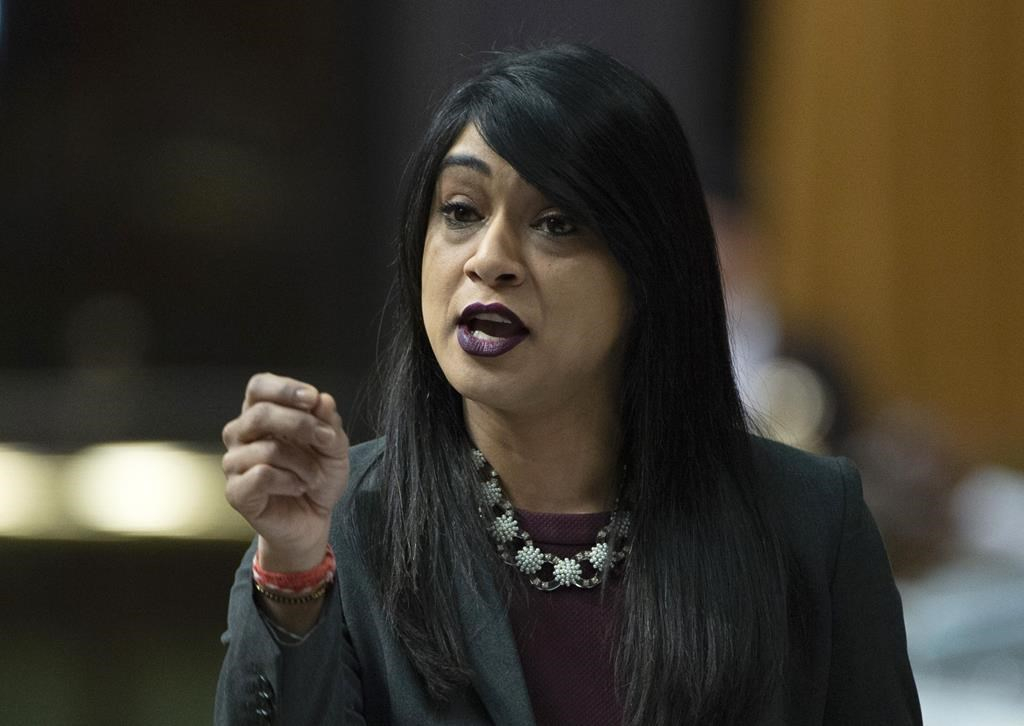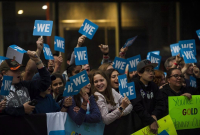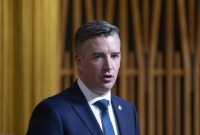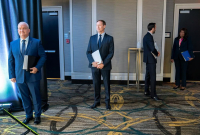Support strong Canadian climate journalism for 2025
The federal minister responsible for a $912-million student volunteering program said Prime Minister Justin Trudeau's office didn't order her to make the agreement with WE Charity that has become mired in ethical questions for the government.
Youth Minister Bardish Chagger told the House of Commons finance committee Thursday she didn't personally have conversations with Trudeau's office, or that of Finance Minister Bill Morneau, or WE itself prior to cabinet approval of the deal.
Days after the prime minister announced WE Charity would run the program, the organization quit amid a controversy about Trudeau's family links to the charity.
During a long and at times testy committee meeting Thursday, MPs heard those family ties were raised during cabinet discussions. MPs also got a timeline about how the agreement came to be, including that the charity first pitched the government on a youth service program in mid-April, days before Trudeau publicly announced plans for one.
Trudeau, and now his finance minister, are facing ethics probes for their roles in the affair and the fate of the Canada Student Service Grant is uncertain.
The timeline of events as laid out to the finance committee began in mid-April when WE sent an unsolicited proposal for a youth service program to Chagger and Small Business Minister Mary Ng.
Officials had already been talking about ways to help students unable to work this summer due to the COVID-19 pandemic, intending to roll out something by mid-May.
It was in that context that Finance Department officials mentioned WE during conversations with counterparts at Employment and Social Development Canada, which oversees student-related programs.
Rachel Wernick, a senior ESDC official, said she offered to call WE and explore potential options for a student service program because of the organization's previous involvement with the department.
She told the committee she called WE co-founder Craig Kielburger on April 19 at which time she learned of the original proposal.
Three days later, on April 22, Trudeau announced a $9-billion package of student aid, including the outline of a volunteer program paying students up to $5,000 toward education costs, based on the number of hours they volunteer.
Wernick said Kielburger emailed her an updated proposal based on the prime minister's announcement.
In a June 12 video chat with youth leaders, a copy of which was obtained by The Canadian Press, brother and WE co-founder Marc Kielburger said he heard from Trudeau's office on April 23 about the volunteer program.
In a statement last month, Marc Kielburger said the contact came the week of April 26 from an ESDC official (he cited Wernick's title but not her name), and not the PMO.
Chagger's deputy minister, Gina Wilson, told the committee that officials determined early on that going with a wide, or even limited, call for proposals to run the program would have taken two months or more, which was too long.
Chagger said the recommendation, made in writing by Wernick, was that WE was the only organization that could run and scale up the grant program.
"I asked the same question as to why the public service could not offer this program," Chagger told the committee. "It was recommended that WE Charity be used because they had the capacity as well as the network to deliver this program."
In mid-May, negotiations on a funding agreement began, the committee heard. The final deal had WE Charity eligible to receive up to $43.53 million to administer the program if it landed 40,000 placements.
Paula Speevak, chief executive of Volunteer Canada, a charity that promotes volunteering and helps organizations use volunteers well, said that WE suggested in meetings between May 25 and June 3 that the target for placements had gone from 20,000 to 100,000.
Before that, her group raised concerns about paying hourly rates below minimum wage and calling it "volunteering," telling Chagger that could undermine future engagement.
Chagger didn't say how many positions the program was supposed to create for students or who in her office spoke with the Prime Minister's Office about the deal prior to its being finalized on June 23.
NDP ethics critic Charlie Angus pressed Chagger about whether Trudeau's family links were raised when she brought the recommendation to cabinet.
"We have tough conversations around the cabinet table, we have tough conversations around our team," Chagger said. "Yes, these questions were posed."
On July 3, WE gave up the contract amid the controversy about its connections to Trudeau and speaking fees paid to his brother and mother.
Trudeau has admitted he should have recused himself from the decision to award the contract, as has Morneau, whose daughter works for the WE organization.
The prime minister didn't say Thursday whether he would testify at committee as opposition MPs want.
"I'm looking forward to speaking next week at Parliament," Trudeau said, referring to a scheduled July sitting. "I know there will be a range of questions from opposition parties."
Ethics commissioner Mario Dion has already said he'll investigate Trudeau's role in the affair. Dion's office said Thursday that Morneau would be scrutinized as well to see if he violated sections of conflict of interest rules.
The average time to complete an ethics investigation is seven months.
This report by The Canadian Press was first published July 16, 2020.





Comments